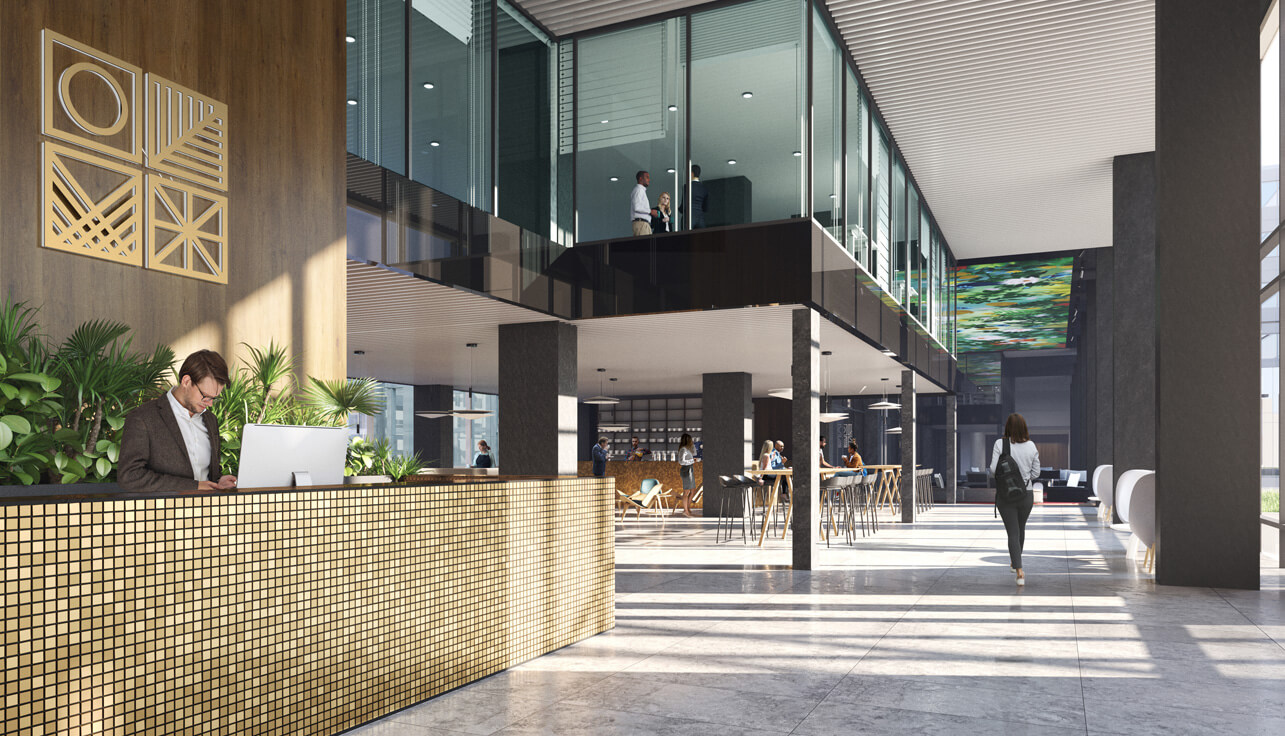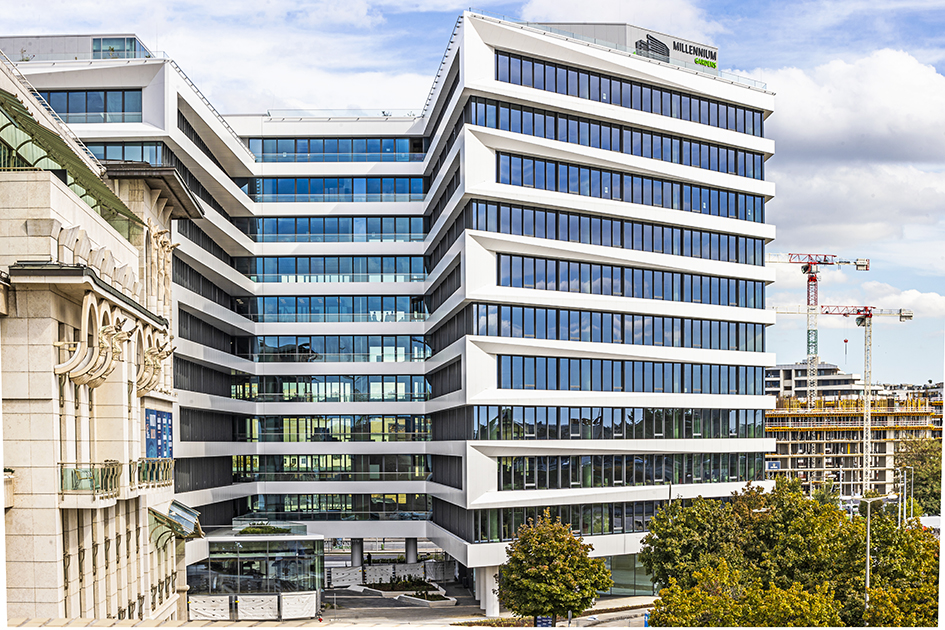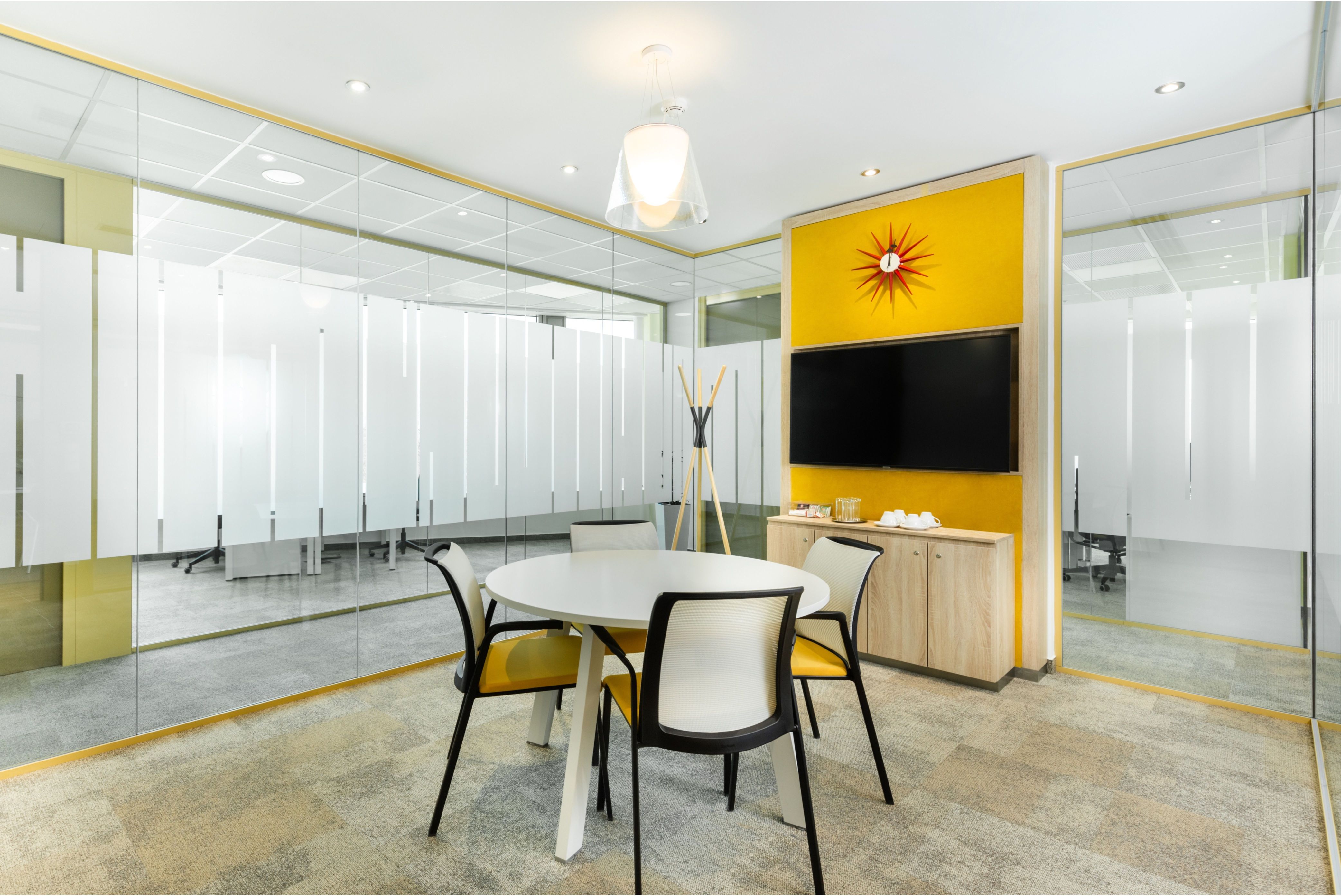Office Projects Going Ahead Despite COVID Concerns
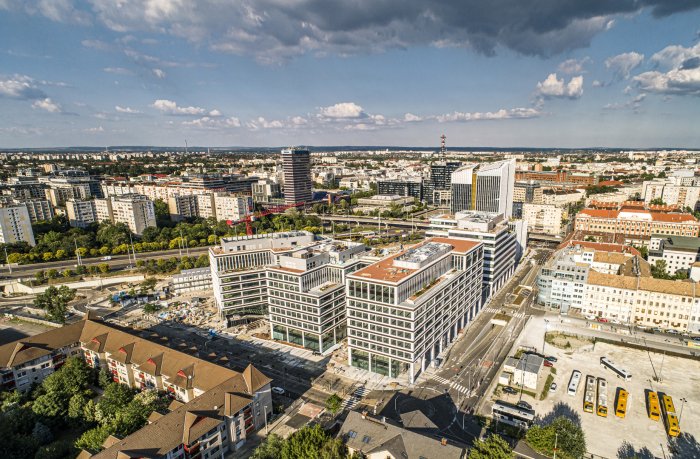
The Budapest office market has been recording favorable indicators with low vacancy, high and consistent demand and in general well-conceived development strategies. The quality of product from an exterior and interior design and sustainability perspective has improved rapidly in response to market demand and sustainability regulations.
Agora Budapest
The office market now has to make further qualitative advances in response to the coronavirus crisis in terms of interior design and layout, property and finance management with regard to hygiene and climate quality issues. When, and if, a full recovery in demand and investment occurs remains to be seen.
The sector has some of the lowest vacancy levels on record, while at the same time supply has been relatively constrained in comparison with past cycles. Although this year demand is being held back compared to the previous year, a significant proportion of the current pipeline is prelet.
The market has a potential pipeline of more than 570,000 sqm in the development of large-scale, phased speculative project by developers such as Atenor, HB Reavis and CPI and Skanska. Further, developers such as Horizon Development, Wing and Codic are due to deliver single standing major projects.
Office stock in Budapest now stands at 3.86 million sqm according to the Budapest Research Forum (consisting of CBRE, Cushman & Wakefield, JLL, Colliers International, Eston International and Robertson Hungary). In general developers are delivering projects according to schedule, despite the challenges in the construction and letting processes caused by the coronavirus.
The overall vacancy rate stands at 8%, a slight rise, although very low compared to previous development cycles. According to Cushman & Wakefield, 48,000 sqm of space is due to be delivered in the second half of the year. New projects are still being undertaken as CBRE has traced 580,000 sqm of space under construction reflecting the confidence of developers despite the COVID-19 virus.
Confidence
“Developments has been able to move ahead largely according to schedule and the handful of newly kicked off projects reflects confidence among investors,” the consultancy comments.
In the view of Cushman & Wakefield, demand levels in the Budapest office market have been constrained compared to previous years and dominated by renewals. Further, as new supply is continuing, the vacancy rate has increased from its record low at the end of 2019.
“Ongoing development schemes continue, and no major delays are reported. While the pipeline for the 2020-2022 period shows an increased level compared to the amount seen in the last 10 years, the impact of WFH [work from home] in Budapest remains to be seen on future demand and design. Large-scale transactions, however, have proceeded and we have seen large occupiers committing for long-term leases,” says the consultancy in its latest market analysis.
CPI is planning an office complex at a site close to Árpád híd. The BREEAM “Very Good” accredited, EUR 31 million Balance Hall office development was completed at the turn of the year and forms part of the 35,000 sqm Balance Office Park; the complex is expected to be close to fully let within a year according to CPI.
“Although our day-to day lives have been transformed by the COVID-19 crisis, we do believe that the domestic office market relies on firm fundamentals that will bring about an upswing in the rental market once the pandemic is over so we can resume and continue our value creating real estate development thereafter,” comments Mátyás Gereben, Hungary managing director at CPI.
The Váci Corridor continues to be the favored office development destination with an estimated 170,000 sqm of space under construction, according to Cushman & Wakefield: the sub-market has a vacancy rate of 4% and the highest share of take-up in the Budapest office market.
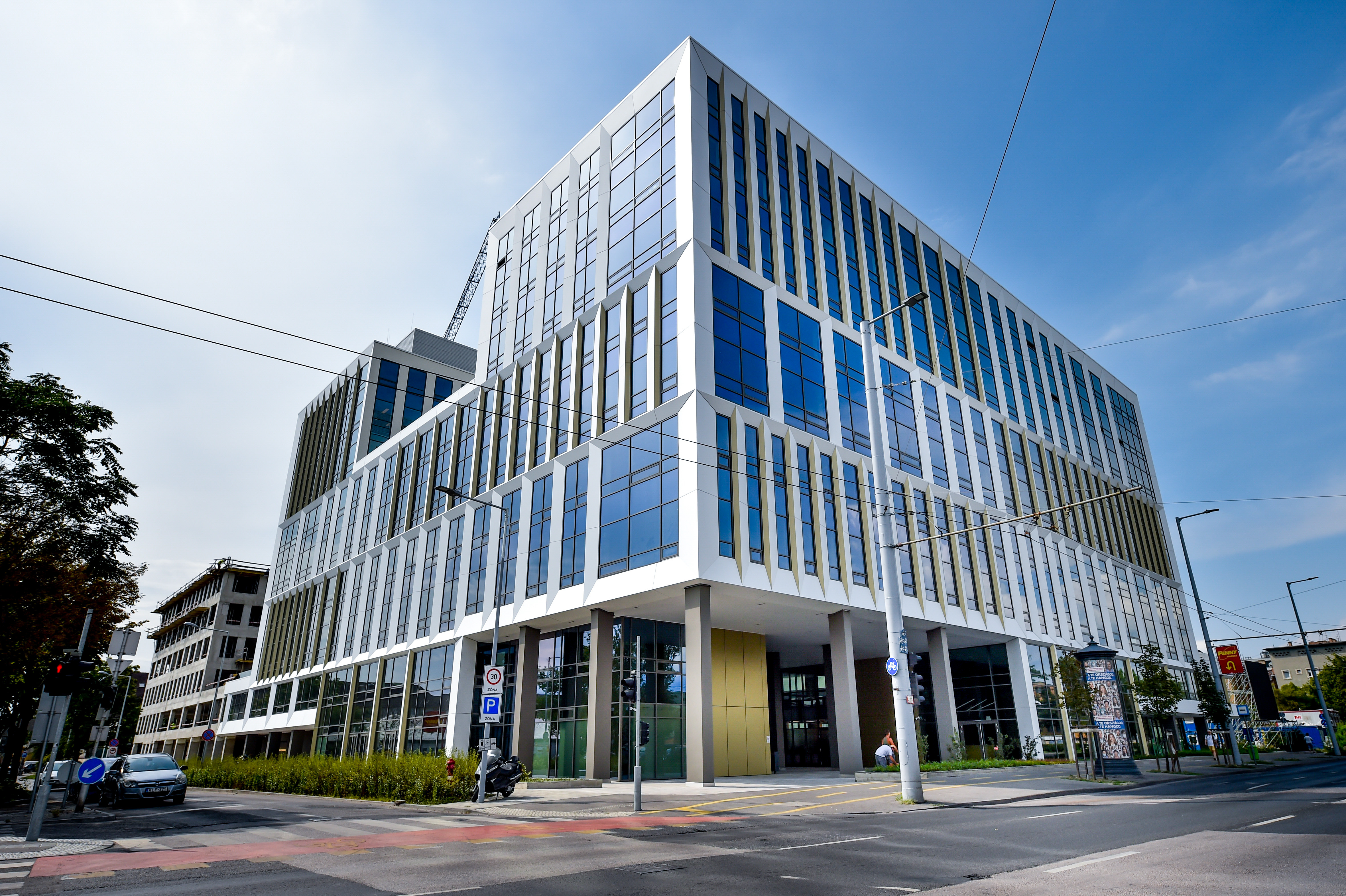
Arena Business Campus
Interconnected
Skanska has started development of the 26,000 sqm first phase of the 65,000 sqm H2Offices, consisting of three interconnected buildings in the corridor. The EUR 65 mln complex has been designed by the Danish Arrow Architects studio, with Skanska aiming for WELL and LEED “Platinum” accreditation. As with CPI, the developer has successfully maintained a land bank as plots along Váci út have become more difficult to source.
In another Váci project, regional developer Codic, in partnership with the Hungarian residential developer, Pesti Házak and the Swiss investment company Picton Group, is due to complete the 20,000 sqm, BREEAM “Excellent” Green Court Office by the end of 2021. The project is already 65% prelet, according to Codic.
However, with the rising popularity of the area, well-located development sites with direct access to public transportation links have become more difficult to source and leading developers are now looking at other areas of the city that provide similar development opportunities.
Bayer Hungária has leased 3,000 sqm at the LEED “Gold” accredited, 20,000 sqm BudaPart City, due to complete next year by Property Market. Bayer chose the project due to its unique location, the quality of the office environment and green area, and the fact that it is a developing business district, according to Pál Tamás, head of office agency and tenant representation at Eston International, who represented the developer in the deal.
“I think location will remain a key aspect and gain even more focus, therefore the demand for well-placed and modern buildings will still be high. BudaPart, as a project with mixed functions, offers a complex opportunity for its residents and tenants,” says Mihály Schrancz, managing director at Property Market.
“Thanks to being located next to the Danube and Kopászi Dam, we are close to nature and a green environment, but as a result of the neighborhood’s services, everybody can enjoy the urban vibe as well. At BudaPart, we are proceeding according to the plan regarding our office and residential developments: the building of BudaPart CITY and BudaPart Homes ‘E’ in the neighborhood is in progress, which is expected to be handed over in 2021, and we are also planning to start a new office, residential buildings and a hotel as well,” he adds.
Outer Hub
The outer boulevard of Budapest has developed into an office hub as Wing is constructing the 42,000 sqm Liberty office complex, adjacent to the completed 58,000 sqm Magyar Telekom Group headquarters it also built.
Also along the boulevard, Atenor has delivered the 20,000 sqm BREEAM “Excellent” accredited Aréna Business Campus A, the first sqm phase of the speculative, accredited, 85,000 sqm project in the outer boulevard of Budapest; ground work has already started on a second 14,000 sqm phase of the project.
One of the major challenges for office developers in Budapest is to source suitably-sized, well-located development plots that provide visibility at a time when competition for such space is becoming more intense and more expensive.
As a consequence of that process, office hubs are now appearing outside the established business areas as developers source new areas of the city with potential. Atenor has started construction of the 18,000 sqm BakerStreet in South Buda, the scheduled hand-over being the second quarter of 2022.
“Ongoing developments proceed, no delays can be expected. For example the current constructions of all four of Atenor’s office buildings are ongoing as per the original program,” says Nikolett Püschl, leasing and development director at Atenor Hungary.
The company is celebrating the completion of the 120,000 sqm Váci Greens, a phased project consisting of six buildings. Five office buildings have been sold to various domestic and international investors.
Historic Core
Development plots are particularly difficult and expensive to source in the historic core of Budapest and therefore a central CBD business district has not emerged as it has in Warsaw and is doing so in Bratislava. The Szervita Square Building by Horizon Development that is due to deliver 12,500 sqm of fully leased, LEED “Platinum” accredited office space is a rare office development in the center.
Agora Tower and Agora Hub, the first speculative 66,000 sqm phase of the 136,000 sqm Agora Budapest by HB Reavis, designed by the London-based Make Architects and Budapest’s Finta studio will deliver retail and service space and open squares, which is to be utilized by the local population, as well as redeveloping the area adjacent to the Árpád híd metro station.
The concept is of a reciprocal benefit to both the developer, companies that locate to the project and the surrounding population according to HB Reavis. “Companies are looking for flexible, safer, healthier multifunctional workplaces and energy-efficient solutions focusing on sustainability,” says Zsolt Berényi, acquisition and development director at HB Reavis Hungary.
“Ideally, office buildings should organically connect to the environment and serve their users and people in the area in the longer term. HB Reavis has already implemented these values into practice for years. All HB Reavis developments are designed based on BREEAM and WELL criteria,” Berényi adds.
Püschl, from Atenor, argues that the key focus for her firm is that its developments will increase the attractiveness of cities and will satisfy the needs and demands of today’s users, working in close cooperation with the authorities to be able to create a symbiosis with the environment and the citizens.
In general, business complexes are expected to integrate into their surroundings by offering service, public squares and green areas that provide a mutual benefit to developers and the surrounding areas. With regard to the development of an office project, the most important factors are seen as the proximity and variety of public transport, the different amenities within walking distance, the business nature of the district and also accessible green areas nearby. When it comes to transport links, the ideal is a metro within 400 meters.
Office Density
Looking at office density in the pandemic environment, there are two counter-balancing forces with regard to office space; homing working is freeing up space and the density of offices has changed with social distancing requiring more space, according to Gábor Borbély, business development and research director at CBRE Hungary.
“Instead of obstacles, we see opportunities, partly due to the pandemic, which created an increase in the demand for human-centered workplaces. This is one of the main factors why the construction and leasing of Agora Budapest continued unabated during the pandemic and there were no cancellations or suspended leasing processes,” says Berényi.
“We may definitely conclude that the demand for high quality, people-orientated offices offering smart solutions and advanced on-site services has actually increased due to the pandemic. Employees are realizing the value of ensuring the health, wellness and wellbeing of employees in the workplace,” he explains.
“More and more companies realize that the key to success resides in the human factor, so they do their best to create employee-centered, wellbeing enhancing, high standard office ecosystems, where people can pass on information, collaborate and create things together more efficiently,” says Berényi.
When it comes to the longer term prospects for office, analysts argue that take up needs to return to its previous levels. There are a number of planned schemes that are ready to be launched and many developers have substantial landbanks that could meet future demand.
Furthermore there is a vast amount of local and international equity seeking a home. In this way investors could provide an exit strategy for developers at a time of their choosing when the investment market picks up. Office is expected to continue to be the investment sector of choice, although even when investment activity picks up, market activity will continue to be restricted by a limited supply of investment grade product.

Balance Hall
SUPPORT THE BUDAPEST BUSINESS JOURNAL
Producing journalism that is worthy of the name is a costly business. For 27 years, the publishers, editors and reporters of the Budapest Business Journal have striven to bring you business news that works, information that you can trust, that is factual, accurate and presented without fear or favor.
Newspaper organizations across the globe have struggled to find a business model that allows them to continue to excel, without compromising their ability to perform. Most recently, some have experimented with the idea of involving their most important stakeholders, their readers.
We would like to offer that same opportunity to our readers. We would like to invite you to help us deliver the quality business journalism you require. Hit our Support the BBJ button and you can choose the how much and how often you send us your contributions.







